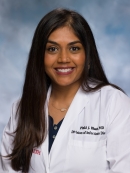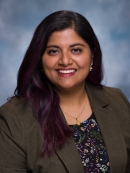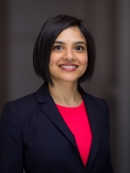
Division of Allergy, Immunology, and Infectious Diseases
Welcome to the Division of Allergy, Immunology, and Infectious Diseases
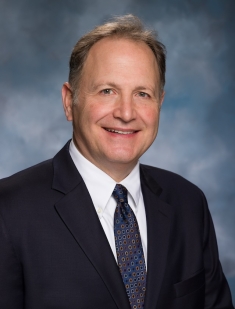
The Division of Allergy, Immunology, and Infectious Diseases has several missions. These include providing superb patient care within our subspecialty disciplines — development and implementation of superior educational programs for medical students, residents, and subspecialty fellows; providing cutting-edge programs in infection prevention, antimicrobial stewardship and transplant infectious diseases; and performance of innovative clinical and/or basic research to advance the ability of physicians to diagnose and manage infectious diseases and allergic disorders.
At the undergraduate level, members of the Division teach first- and second-year students in lectures and one-on-one at the bedside; serve as preceptors for Physical Diagnosis and OSCE sessions; lecture to 3rd- and 4th-year medical students during their Medicine clerkships; and supervise students on infectious diseases or allergy clinical and research rotations. At the post-graduate level, faculty members serve as clinical, research and career mentors for resident physicians in both infectious diseases and allergies. The division also leads a top-notch fellowship in infectious diseases that, in addition to providing exceptional clinical training, also offers specialty tracks in transplant infectious diseases and research.
Members of the Division serve as consulting physicians on the General Teaching, General Non-teaching and Immunocompromised Host Infectious Diseases Consultation Services at Robert Wood Johnson University Hospital (RWJUH). John Mills, MD, serves as Medical Direct of Infection Control, and Tanaya Bhowmick, MD, serves as Medical Director of the Antimicrobial Stewardship Program at RWJUH. Pinki Bhatt, MD, serves as Section Chief, Transplant and Oncology Infectious Diseases and Anjali Majumdar, MD, serves as the Infectious Diseases Transplant Director. Specialty care is provided for outpatients with allergic disorders, general infectious disease problems, infectious diseases affecting patients with cancer and/or transplant recipients, HIV infection, and Hepatitis B and Hepatitis C viral infections.
I hope you will find our web pages informative and useful. Please click here to learn more about The Division of Allergy, Immunology, and Infectious Diseases, as well as the Department of Medicine as a whole.
Keith S. Kaye, MD, MPH
Chief, Division of Allergy, Immunology and Infectious Diseases
Our Faculty
Meet the esteemed faculty within the Division of Allergy, Immunology and Infectious Diseases who offer invaluable expertise and guidance in leading-edge medical research and patient care.
Meet The Experts
Our specialists in infectious diseases provide a full range of consultative services for adults with infections. These conditions include but are not limited to, post-surgical infections, infections in transplant and other immunocompromised patients, and infections of the skin, bones, joints, lungs, and intestines. In addition, we manage and treat patients with HIV infection and/or chronic hepatitis B and C.
The division’s allergy and immunology specialist evaluates and treats adults and children with allergic and immunologic disorders. Services include testing for allergies to medications and environmental triggers, desensitization (“allergy shots”), and management of immune deficiencies.
Infectious Disease Fellowship Program
Advance Your Career
The Infectious Disease Fellowship Program trains fellows in several inpatient and outpatient situations, with additional experience in infection prevention, hospital epidemiology, and antimicrobial stewardship.
The two-year fellowship has the traditional educational, research, and patient care components, and is supported by the division’s full-time and volunteer faculty.
Overview
The Division's faculty has a broad range of research interests. These include hospital epidemiology, diagnostic testing, development and evaluation of innovative culture and nonculture-based systems to detect bloodstream infections; laboratory detection of emerging antimicrobial resistance; improved methods of in vitro susceptibility testing; implementation of systems to optimize the rational use of antimicrobial agents; and clinical trials of innovative antibiotics for multidrug-resistant bacteria.
In addition, the ID and allergy faculty annually mentor medical students, medical residents and ID fellows in numerous quality assurance and other clinical research projects.
Selected Peer-Reviewed Publications from AY 2023-2024
Albin, O. R., Troost, J. P., Saravolatz, L., 2nd, Thomas, M. P., Hyzy, R. C., Konkle, M. A., Weirauch, A. J., Dickson, R. P., Rao, K., & Kaye, K. S. (2024). A quasi-experimental study of a bundled diagnostic stewardship intervention for ventilator-associated pneumonia. Clin Microbiol Infect, 30(4), 499-506. https://doi.org/10.1016/j.cmi.2023.12.023
Bhowmick, T., Abdul Azim, A., Narayanan, N., & Kaye, K. (2023). Traits and skills of effective leaders in antimicrobial stewardship. Antimicrob Steward Healthc Epidemiol, 3(1), e222. https://doi.org/10.1017/ash.2023.499
Dhar, S., Jinadatha, C., Kilgore, P. E., Henig, O., Divine, G. W., Todter, E. N., Coppin, J. D., Carter, M. J., Chopra, T., Egbert, S., Carling, P. C., & Kaye, K. S. (2024). Lowering the Acquisition of Multi-drug Resistant Organism (MDROs) with Pulsed-xenon (LAMP) Study: a cluster randomized controlled, double-blinded, interventional crossover trial. Clin Infect Dis. https://doi.org/10.1093/cid/ciae240
Kaye, K. S., McLeod, S. M., O'Donnell, J. P., & Altarac, D. (2023). Sulbactam-durlobactam for infections caused by Acinetobacter baumannii-calcoaceticus complex - Authors' reply. Lancet Infect Dis, 23(8), e275-e276. https://doi.org/10.1016/S1473-3099(23)00423-1
Kerai, A., Doshi, S., Laleker, A., & Majumdar, A. (2024). Fungal Foe and Mechanical Hearts: A Retrospective Case Series on Candida auris Bloodstream Infection With Left Ventricular Assist Devices. Open Forum Infect Dis, 11(6), ofae286. https://doi.org/10.1093/ofid/ofae286
Majumdar, A., Shah, M. R., Park, J. J., Narayanan, N., Kaye, K. S., & Bhatt, P. J. (2023). Challenges and Opportunities in Antimicrobial Stewardship among Hematopoietic Stem Cell Transplant and Oncology Patients. Antibiotics (Basel), 12(3). https://doi.org/10.3390/antibiotics12030592
McDonald, E. G., Aggrey, G., Tarik Aslan, A., Casias, M., Cortes-Penfield, N., Dong, M. Q. D., Egbert, S., Footer, B., Isler, B., King, M., Maximos, M., Wuerz, T. C., Azim, A. A., Alza-Arcila, J., Bai, A. D., Blyth, M., Boyles, T., Caceres, J., Clark, D., . . . Lee, T. C. (2023). Guidelines for Diagnosis and Management of Infective Endocarditis in Adults: A WikiGuidelines Group Consensus Statement. JAMA Netw Open, 6(7), e2326366. https://doi.org/10.1001/jamanetworkopen.2023.26366
McLeod, S. M., O'Donnell, J. P., Narayanan, N., Mills, J. P., & Kaye, K. S. (2024). Sulbactam-durlobactam: a beta-lactam/beta-lactamase inhibitor combination targeting Acinetobacter baumannii. Future Microbiol, 19(7), 563-576. https://doi.org/10.2217/fmb-2023-0248
Mohayya, S. M., Arsalan, M., Narayanan, N., Patel, P., Hong, C. G., Kirn, T. J., Bhatt, P. J., & Bhowmick, T. (2023). Impact of phenotypic rapid diagnostic assay on duration of empiric antibiotics for gram-negative bacteremia. Antimicrob Steward Healthc Epidemiol, 3(1), e22. https://doi.org/10.1017/ash.2022.331
Patell, R., Cool, J. A., Merchant, E., Dodge, L. E., Ricotta, D. N., Persaud, B., Gomez, L. K., Yang, L., Trainor, A., Carney, B., William, J., Lecker, S., Theodore, M., Petri, C., Horst, D., Stein, D., Forbath, N., Azim, A., Hale, A. J., & Freed, J. A. (2024). Rethinking the consultation paradigm: Validity evidence for a new framework, a multimethods study. J Hosp Med, 19(4), 259-266. https://doi.org/10.1002/jhm.13312
Pierce, V. M., Bhowmick, T., & Simner, P. J. (2023). Guiding antimicrobial stewardship through thoughtful antimicrobial susceptibility testing and reporting strategies: an updated approach in 2023. J Clin Microbiol, 61(11), e0007422. https://doi.org/10.1128/jcm.00074-22
Rao, K., Zhao, Q., Bell, J., Krishnan, J., Henig, O., Daniel, J., Sawaya, K., Albin, O., Mills, J. P., Petty, L. A., Gregg, K., Kaul, D., Malani, A. N., Pogue, J., & Kaye, K. S. (2024). An Open-Label, Randomized Trial Comparing Fidaxomicin With Oral Vancomycin for the Treatment of Clostridioides difficile Infection in Hospitalized Patients Receiving Concomitant Antibiotics for Concurrent Infections. Clin Infect Dis, 78(2), 277-282. https://doi.org/10.1093/cid/ciad606
Roy, A. S., Hagh-Doust, H., Abdul Azim, A., Caceres, J., Denholm, J. T., Dong, M. Q. D., King, M., Yen, C. F., Lee, T. C., & McDonald, E. G. (2023). Multidisciplinary Teams for the Management of Infective Endocarditis: A Systematic Review and Meta-analysis. Open Forum Infect Dis, 10(9), ofad444. https://doi.org/10.1093/ofid/ofad444
Simon Frances, B., Nair, N., Gaur, A., Plotz, B., & Majumdar, A. (2023). Spectre of COVID-19 infection confounding myocarditis related to cytomegalovirus mononucleosis syndrome and hyperinflammatory syndrome. Heliyon, 9(11), e21383. https://doi.org/10.1016/j.heliyon.2023.e21383
Sui, J., Lin, Z., Azizpour, S., Chen, F., Gaur, S., Keene, K., Soleimani, F., Bhowmick, T., Rafique, Z., & Javanmard, M. (2024). Clinical evaluation of a fully electronic microfluidic white blood cell analyzer. PLoS One, 19(1), e0296344. https://doi.org/10.1371/journal.pone.0296344
Yang, A. F., Sherman, A., Nazarian, E., Haas, W., Mehr, J., Pedrani, M., Kirn, T., Brant, S., Boruchoff, S. E., Kaye, K. S., & Mills, J. P. (2024). Evidence of transmission of New Delhi metallo-beta-lactamase-producing Klebsiella pneumoniae through a gastrointestinal endoscope without an elevator channel. Infect Control Hosp Epidemiol, 1-6. https://doi.org/10.1017/ice.2024.55
Yassin, A., Kaye, K. S., & Bhowmick, T. (2024). Unitary Tract Infection Treatment: When to Use What Agents including Beta-lactam Combination Agents. Infect Dis Clin North Am, 38(2), 295-310. https://doi.org/10.1016/j.idc.2024.03.007
Details
Being immunocompromised (or having a weakened immune system) from cancer or a transplant can put you at risk for certain infections. If you are anticipating a transplant or recently received one, you want to make sure that you are receiving appropriate evaluation to prevent these infections.
The Robert Wood Johnson Medical School (RWJMS) and Robert Wood Johnson University Hospital Transplant Infectious Disease program’s mission is to provide comprehensive care for the evaluation and management of infections related to hematologic malignancies, bone marrow transplantation, chimeric antigen receptor T-cell (CAR-T) therapy, left ventricular assist device and solid organ transplantation.
If you are anticipating a transplant or recently received one, you want to make sure that you are receiving appropriate evaluation to prevent any infections.
Our experienced clinicians, part of the Division of Allergy, Immunology, and Infectious Disease, are trained to treat transplant and immunocompromised patients with a multidisciplinary approach. Our program works closely with, RWJUH New Brunswick Kidney and Pancreas Transplant Center, Advanced Heart Failure, VAD, and Transplant program, and the Rutgers Cancer Institute of New Jersey to ensure the best possible outcomes.
Clinical Services
- Pre-transplant evaluation and management
- Patient education and counseling for pre-and post-transplant recipients
- Post-transplant infectious disease management
- Bone marrow transplant
- Heart transplant
- Kidney transplant
- Pancreas transplant
- Left Ventricular Assist Device (LVAD) infection management
- Hematologic and solid tumor-related infection management
- Transplant ID
Our Faculty
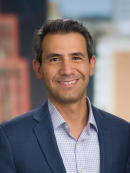
Ahmed Abdul Azim, MD
Assistant Professor and Associate Chair, Antimicrobial Stewardship Program, RWJUH
Emailaa2270@rutgers.edu
To make an appointment with our transplant infectious disease physicians, call 732-235-7060.
The HIV & STI Collaborative
The HIV & STI Collaborative is a collaboration between the divisions of Pediatrics and Adult Infectious Diseases (ID) at Rutgers Robert Wood Johnson Medical School. Both divisions have had a long-standing collaboration, with the Robert Wood Johnson AIDS Program (RWJAP) being an integral part of the clinical services and providing robust, comprehensive, multidisciplinary, culturally diverse and family-centered HIV care services through the Ryan White HIV/AIDS Program.

